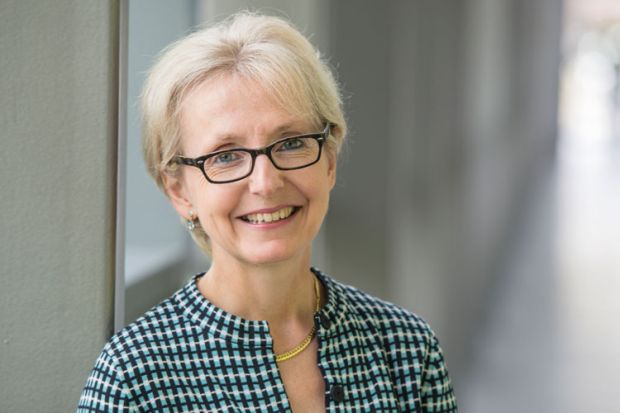Dame Jessica Corner is dean of health sciences at the University of Southampton. In June she was elected chair of the Council of Deans of Health and was also appointed a dame in the Queen’s Birthday Honours.
Where and when were you born?
I was born in Alderbury in Wiltshire in the sitting room of a cottage next to the Green Dragon pub.
How has this shaped you?
I grew up with my three sisters on a large farm on Salisbury Plain. The rolling chalk downland and lots of sheep are part of my DNA.
You’ve had a double whammy of celebratory news recently with the conferring of your DBE. Which was the more surprising?
The DBE definitely. It was a complete surprise and was announced to the public on the day I heard the news that I had been elected as chair of the Council of Deans of Health – quite a day.
Should Joe Bloggs care about your work?
Yes, the quality and safety of care rests in the hands of the people we train and in the research that underpins care.
How do UK universities compare to international counterparts in health education provision?
They are among the best – research and citations of our research tell us this. We could be better resourced, though, and I have not seen a system elsewhere as heavily managed or regulated.
How destabilising is the government’s funding squeeze for the NHS?
The very real possibility that funding levels for training nurses and allied health professionals may be cut is a deep concern as this may undermine the huge progress we have made in developing nursing as a graduate and research-based profession. This follows previous cuts to the number of training places for nursing in universities in England. The result is now a national shortage of nurses when the evidence that there is a direct relationship between the number of graduate nurses on wards and hospital mortality has become clear.
As a representative body for HE in the health sector, do policymakers make enough use of your expertise?
We are increasingly invited to be fully involved in working groups…and we work very hard to provide expert input into these. We often feel, though, that health policy is made in a knee-jerk fashion, particularly where the emotive subject of nursing and care issues are concerned. A quick phone call to the council could help shape policy so that its workability can be better thought through.
What kind of undergraduate were you?
I was the first in my family to go to university. I was diligent and excited about the world that university opened up for me – it was life changing.
What advice would you give to your younger self?
No need to work quite so hard, I seem to have an inability to be anything but overly conscientious.
What keeps you awake at night?
My husband’s addiction to Radio 5 live.
Tell us about someone you’ve always admired.
Sir Kenneth Stowe, former principal private secretary to Harold Wilson and Margaret Thatcher among many other roles. He was chair of the Institute of Cancer Research, where I worked early in my career. He took me under his wing, offered me wise advice and invisibly “swept the path in front of me” as I found my way as the first [nursing] academic in the country’s leading cancer science institute. If only such mentorship was more widely available.
As a child, what did you want to do when you grew up?
Age 5 a lorry driver, age 10 a pilot, age 14 a classical musician, age 17 a nurse – I did at least fulfil one of my early ambitions.
What do you do for fun?
Cook for friends, jog or walk around the beautiful Test Valley and what I call “holidays in a day” with my two daughters, which is usually lunch, Topshop for the teenager, art galleries and the theatre or a concert in London.
What are the best and worst things about your job?
I love discovering the amazing things that colleagues are doing in health sciences and across the university – there is something incredible and creative going on behind every door. The worst thing is the unending need to push back about the stereotyped ideas about nurses and nursing research as being worthy of academic effort and investment. We need to move on.
Register to continue
Why register?
- Registration is free and only takes a moment
- Once registered, you can read 3 articles a month
- Sign up for our newsletter
Subscribe
Or subscribe for unlimited access to:
- Unlimited access to news, views, insights & reviews
- Digital editions
- Digital access to THE’s university and college rankings analysis
Already registered or a current subscriber? Login

